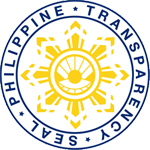NEWSFEED
PTTC-GMEA receives the prestigious Gov Media Awards' National Training Program of the Year!
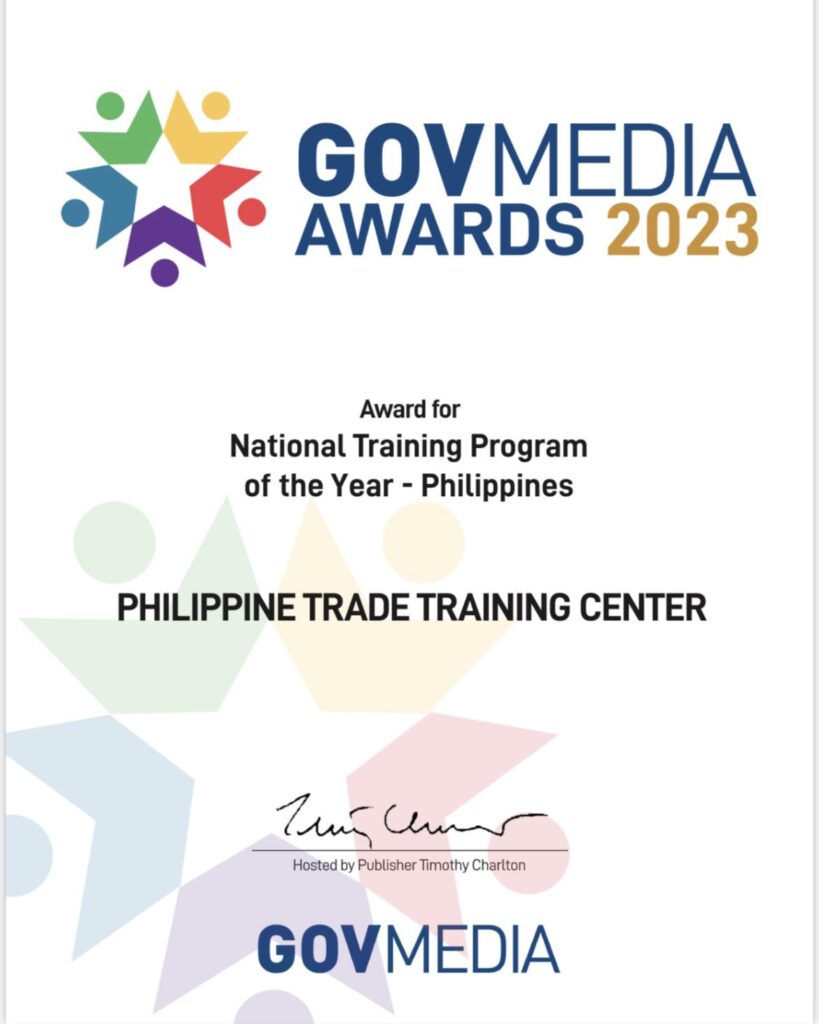

In line with our mission to provide #TrainingForNationBuilding, our training programs have truly made a mark, shaping our nation’s development and creating a positive impact on the global stage.
By fostering innovation, investing in cutting-edge technologies, and promoting sustainable practices, our program has become a catalyst for transformative change, empowering MSMEs and contributing to the economic growth and competitiveness of the Philippines.
We are immensely proud of our team’s dedication and commitment to excellence, and this well-deserved recognition is a testament to the hard work and passion we put into upskilling and empowering entrepreneurs in our country.
This incredible journey has been a collaborative effort, and we want to express my gratitude to everyone involved who has contributed to the success of our training program. Together, we have made a difference and positively impacted the lives of countless individuals in the Philippines and beyond.
Thank you to Gov Media for this honor and for recognizing the value of our efforts in fostering growth and sustainability. We are truly humbled and inspired to continue our mission of providing #TrainingForNationBuilding, empowering MSMEs, and making a positive impact on our nation’s economic landscape.
Congratulations to our entire team and all our partners for this remarkable achievement! Let’s continue to strive for excellence and create a brighter future for our country and its entrepreneurs.
PTTC-GMEA empowers Philippine Halal industry through National Halal Capability Building Program

Highlighting the importance of Halal industry in the country’s economic growth, the Philippine Trade Training Center – Global MSME Academy on Tuesday (April 18, 2023) conducted a multi-stakeholder summit titled “Global Halal Excellence: Upskilling, Reskilling, and Converging Halal Capability Building.” .
Highlighting the importance of Halal industry in the country’s economic growth, the Philippine Trade Training Center – Global MSME Academy on Tuesday (April 18, Attended by more than 200 participants both online and on-site, the event was crucial to the Halal industry in the Philippines as it provided a platform for experts in the field to share their knowledge and best practices in Halal production and certification. The event focused on the importance of Halal certification in global trade, particularly in the Muslim market. The Halal industry in the Philippines has been growing steadily, and this event played a crucial role in ensuring that the industry continues to thrive.
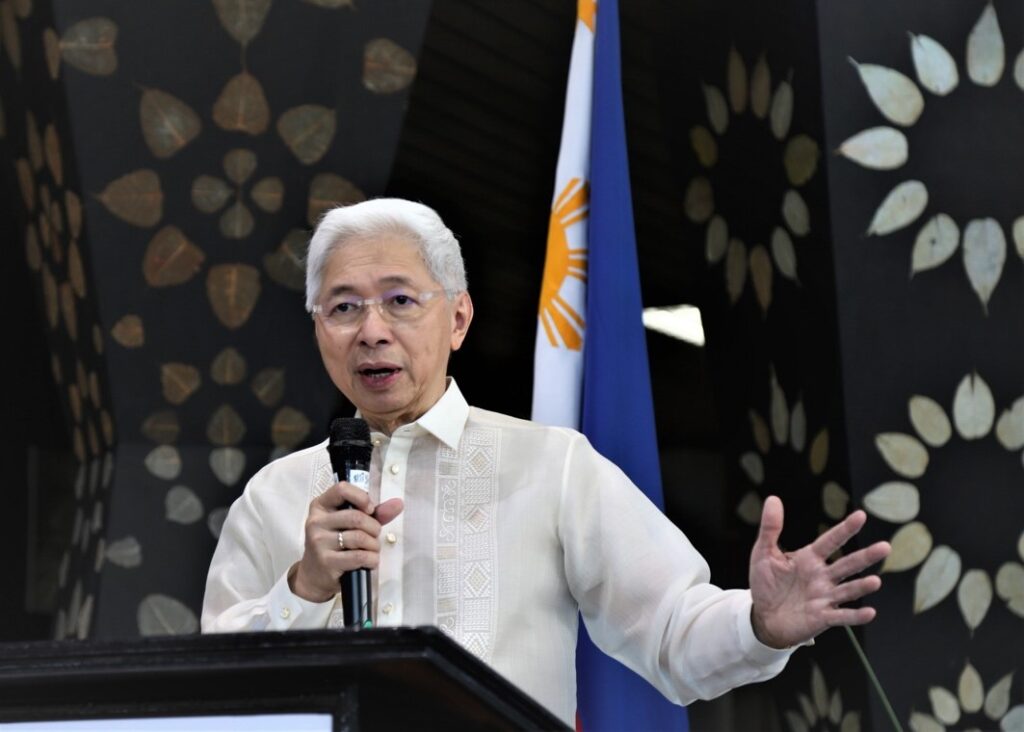
“We see halal food as a sunrise industry. The growing Muslim population is a strong demand driver of the halal economy. Estimated at 1.9 billion in 2020, Muslims are 25% of the world’s population and projected to grow up to 2 billion by 2030,” Secretary Pascual said.

In his welcome message, Philippine Trade Training Center – Global MSME Academy Deputy Executive Director and Halal Program Brand Manager Dimnatang Radia expressed his gratitude and appreciation to the attendees of the event.
“This is such a momentous event not only for PTTC-GMEA but to the entire Halal industry as we try to learn processes, systems, best practices, and many others as we upskill, reskill, and converge our fellow Halal advocates,” he said.

““This event highlights the importance of continuous learning and capacity building in the halal industry. As the demand for halal products and services continues to rise globally, it is crucial for MSMEs (micro, small, and medium enterprises) and other stakeholders to stay ahead by upskilling, reskilling, and converging their capabilities to meet the growing needs of the halal market. This event serves as a platform to promote knowledge sharing, innovation, and best practices in the halal industry, empowering businesses to excel in the global halal ecosystem. Through strategic capacity building initiatives, including training, research, and collaboration, the Philippine Trade Training Center – Global MSME Academy aims to enhance the competitiveness of the halal industry in the Philippines and contribute to the country’s participation in the global halal economy,” said Nelly Nita N. Dillera, PTTC-GMEA Executive Director.
Marketing
Halal Products and Services
During the plenary sessions, Ms. Intan Zalani from the Malaysia External Trade Development Corporation shared insights on promoting HALAL in Malaysia industries like MIHAS, which is a premier international business convention specific for HALAL products and services. She emphasized that well-structured, inter-government operational bodies resulted in the formation of best practices and recommended for the Philippines to strengthen its own inter-government operational bodies, such as EMB with its Halal Section and PTTC-GMEA with its very own Halal Unit, and other agencies pursuant to RA 10817.
Asst. Director Jhino Ilano from the Export Marketing Bureau asserted that there are untapped markets and existing ventures that Philippine MSMEs can capitalize on, such as pharmaceuticals, cosmetics, among others. He recommended that diversification of the HALAL products and services, which will happen by understanding the way of HALAL, would be beneficial for the industry as it breaks misconceptions on HALAL being limited to food only.

Mr. Aleem Siddiqui M. Guiapal, OIC Deputy Director General and Concurrent Group Manager of the Promotions and Public Relations Group from the Philippine Economic Zone Authority, presented opportunities in the existing economic zones in the Philippines and the PEZA mandate of promoting HALAL investments, creating employment for HALAL workers, and generating opportunities for HALAL importation and exportation. He invited MSMEs in the priority industries to partner with PEZA as part of their Investment Attraction Strategies, supported by Pres. Marcos’ EO# 18 for Investment “Green Lanes.”
Attendees were given a brief walkthrough on the steps and requirements in the certification process in Brunei presented by Ms. Wajihah Binti Zainuddin from the Halal Food Control Division, and Ms Siti Hazirah binti Abu Hassan, Head of Inspection Unit both from the Department of Syariah Affairs, Ministry of Religious Affairs, Brunei.
Halal Market Compliance and Requirements
Engineer Rahmatol Mamukid, Director IV from Bureau of Muslim Economic Affairs of the National Commission for Muslim Filipinos, discussed the development of Lanao and Marawi City as HALAL Tourism Special Economic Zones by creating a special Muslim community in every municipality called “Lake Lanao Special Economic Zone.” He emphasized the need for collaboration between existing hotels and beach resorts to create Halal-certified accommodation in the “Lake Lanao Special Economic Zone,” which can benefit other HALAL hubs nationwide.
Dr. Gari Ellinor Hernandez, a Senior Science Research Specialist from the Standards Development Division of Bureau of Agriculture and Fisheries Standards, presented the codes of Halal Slaughtering practices, the health benefits related to food safety, and the process of accreditation for HALAL raw meats. He recommended designating Muslim Halal Officers or a Committee to ensure effective implementation of the Halal Assurance System, as the Halal slaughterhouse is the start of the value chain.

Ms. Ma. Juanita P. Carpio, the Head of the Halal Division of the Philippine Accreditation Bureau, discussed the importance of HALAL certification in the Philippines for Muslims to identify acceptable products. However, it is difficult to impose HALAL standards and procedures on the manufacturing and food processing industry. She emphasized the importance of Mutual Recognition Arrangements (MRAs) in removing trade barriers, efficient enforcement and monitoring of trade, greater acceptance of products and services, and public confidence.
Lastly, one of the recommendations from the Pre-Event Workshops for the Food Sector emphasized the importance of MRAs. MSMEs should take advantage of the Halal certification in the Philippines to capitalize on untapped markets and diversify their products and services. Effective implementation of the Halal Assurance System can be achieved by designating Muslim Halal Officers or Committees in slaughterhouses. Finally, Mr. James Russell A. Sz from the Office of Undersecretary for Mindanao Affairs Myra Paz Valderrosa-Abubakar of the The Department of Tourism (DOT) collaboration between hotels and beach resorts can help create Halal-certified accommodation in HALAL Tourism Special Economic Zones such as the “Lake Lanao Special Economic Zone,” which can benefit other HALAL hubs nationwide.
Training and Development Programs for the Halal Industry
The Philippine Trade Training Center-Global MSME Academy is also playing a significant role in the development of the halal industry, as presented by Engineer Kyrin Christian Pango. PTTC offers a comprehensive and systematic skills-building approach for halal MSMEs through its Enterprise Development Track, which includes a specific halal training program for every MSME. PTTC has developed various training brands to address the needs of MSMEs, such as startups, gender and development, and finance and marketing.
TESDA’s Acting Chief Bernadette Audije recommended strengthening the Area-based Demand Driven TVET program to better recognize which regions and provinces prioritize halal or halal-related skills. TESDA aims to strengthen the skills mapping of Regions IX, X, XI, XII, XIII, and BARMM to better define specialized halal skills.

Meanwhile, Atty. Arifa Ala of the Bangko Sentral ng Pilipinas emphasized the need to reinforce the Islamic Financial Ecosystem, which will create an enabling environment for Islamic banks and Islamic banking windows to operate alongside conventional banks. She recommended promoting financial inclusion and stability to better meet the needs of financially underserved populations and promote a high quality of life for all Filipinos.
Philippine Halal Export Development and Promotions Board Member Sultan Faizal Cocoy Bansao also discussed the role of private sector in the Halal Ecosystem, while Consultancy and Advisory of the Halal Development Corporation Malaysia’s Muhamad Noridham Nordin laid out the best practices and training programs available to the public.
“To assure that follow through is done after this event, maximizing the insights and inputs from our Resource Speakers and guests, as well as the feedback from our MSMEs, the designation of a Halal unit within PTTC-GMEA would be instrumental to this end. As mentioned, this would assure a focused workforce on the advancement of the agency’s platform for Halal industry training in the Philippines. This unit will be capacitated to collaborate with other existing teams at PTTC, such as the Philippine Skills Framework to assist in professionalizing the Halal workforce across sectors,” said PTTC-GMEA Deputy Executive Director and Halal Brand Manager Dimnatang Radia.

DTI-Foreign Trade Services Corps and OIC of the Trade Promotions Group Assistant Secretary Glenn Peñaranda also noted that “it is important for the government to work together with the industry for MSMEs to be educated and trained on the global Halal trade, to establish greater standardization and harmonization of Halal certification, and to ensure that consumers have confidence in the authenticity and integrity of Halal products and services.”
Ambassadors show support to Philippine Halal Industry
Representatives from the embassies of Malaysia, Indonesia, Brunei, United Arab Emirates, and Turkey attended the event. In their messages, Malaysian Ambassador H.E. Dato’ Abdul Malik Melvin Castelino bin Anthony and Turkey’s Third Secretary Mr. Zeki Furkan Kucuk expressed their support for the program and PTTC-GMEA’s vision of creating the Philippine Halal Ecosystem.
“Malaysia stands ready to support, assist, and share experiences that we have with the Philippines and I’m glad to say that with the visit of the Prime Minister of Malaysia and with the meeting with President Bongbong Marcos, a lot of decisions were made and one of it is to promote trade investment which is led by Secretary Pascual, our focus will always be on the Halal industry,” Castelino said.

“I hope that in today’s event, Malaysia and the Philippines will continue to work hand in hand, especially in training related to the Halal industry,” he added.
For his part, Kucuk noted that Turkey “appreciates the efforts of Philippine agencies, especially the Philippine Trade Training Center – Global MSME Academy to establish a halal ecosystem in the Philippines… In this respect, we are really interested in collaboration and cooperation with the Philippines in the near future in this field.”

PTTC-GMEA, BPI Foundation, Inc., BPI Direct BanKo Join Forces to Aid Pandemic-Hit Entrepreneurs
As the Micro and Small Enterprises (MSEs) continue to recover from the ill effects of the COVID-19 pandemic, which led to massive shutdowns, layoffs, and insolvencies due to lockdowns, the Philippine Trade Training Center – Global MSME Academy (PTTC-GMEA), in partnership with the BPI Foundation and BPI BanKo today launched on Wednesday the Small Enterprise Acceleration Lab – Business Expansion through Training and Application Program or SEAL-BETA.
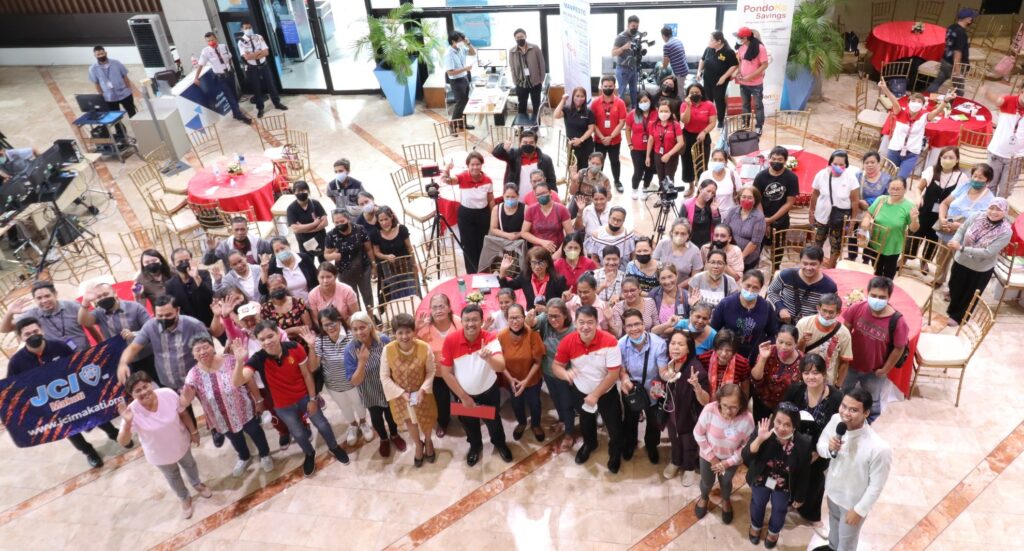
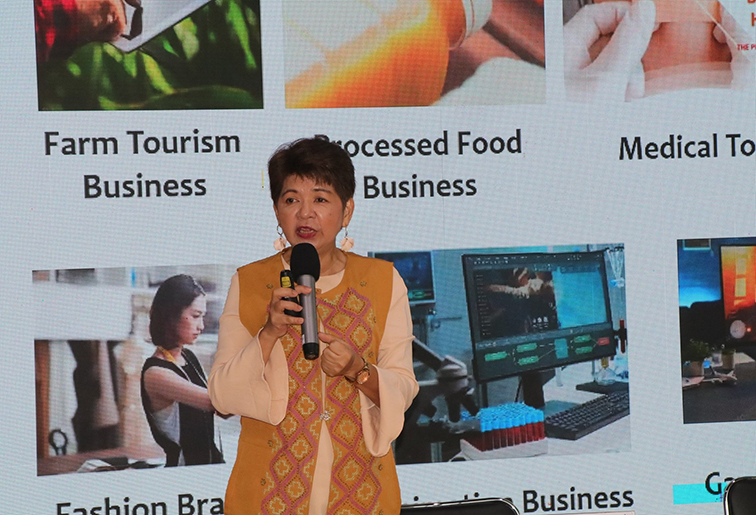
In her opening remarks, PTTC-GMEA Executive Director Nelly Nita N. Dillera noted that access to finance has been one of the main hurdles SMEs had to face in order to continue their businesses.
“Access to finance is one of our challenges during the pandemic, and we’re very happy that our partnership with BPI Foundation and BPI BanKo has actually opened its doors again, not just by providing training for you, but also access to finance,”
“Although the country is starting to recover and all of us are starting to adapt to the new normal, there’s still a need to address the adverse impact of the pandemic on the economy, especially the closure of business and the losses of livelihood due to lockdowns”
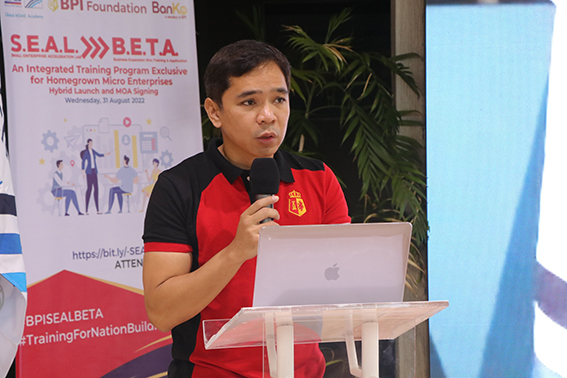
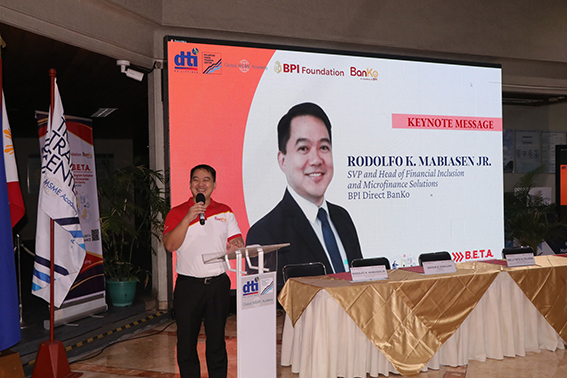
“Dito sa SEAL-BETA, ang role ng BanKo ay magbigay ng access sa dagdag kapital na kailangang kailangan ng mga negosyante, lalo na doon sa mayroong oportunidad ngunit walang kapital. Nandito rin po kami para makapagbigay ng kaalaman para sa mga negosyante kung paano patakbuhin ang kanilang negosyo para kahit na dumating man ang pandemya, ready at sustainable,”
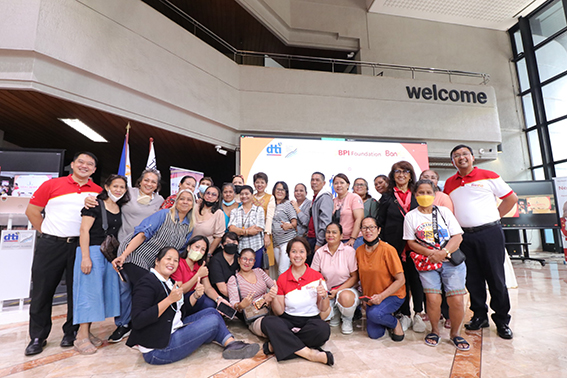
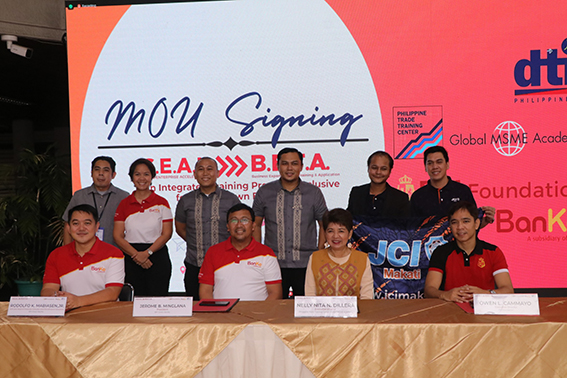
National MSME Week 2022 Puts Premium on Resilient, Innovative, Sustainable, Empowered MSMEs in the Digital Economy
As the country gears towards fully embracing digital transformation, the Micro, Small and Medium Enterprises (MSMEs) need to become resilient, innovative, sustainable, and empowered.
These were highlighted in the week-long celebration of the National MSME Week 2022 with the theme, “RISE MSMEs in the Digital Economy: Resilient, Innovative, Sustainable, Empowered, held via Zoom and Facebook Livestream organized by DTI Regional Operations Group and the Philippine Trade Training Center.

“This year’s celebration of the National MSME Week is an affirmation of the government’s commitment to continue to help boost the Pinoy MSMEs to thrive and expand in an increasingly global and competitive e-commerce industry brought by the COVID-19 pandemic. We will continue to empower the MSMEs and maximize their strength to become more competent and resilient as they embrace the opportunities and challenges of the new and better normal,” said DTI Regional Operations Group (ROG) Undersecretary Blesila A. Lantayona.
The five-day celebration, organized by the Micro, Small and Medium Enterprise Development Council (MSMEDC) featured info sessions on various entrepreneurial topics, all aligned with the government’s strategic goals of the MSME Development Plan 2017-2022 on Business Climate, Access to Finance, Management and Labor Capacities, Technology and Innovation, and Access to Markets. Department of Trade and Industry Assistant Secretary Glenn Peñaranda, in his keynote message, echoed Secretary Alfredo Pascual’s commitment to strengthen MSMEs and its transition to digital transformation.

“Part of the MSME agenda is to transition and fully embrace digital transformation. We have already seen the benefits of going digital: improving operating efficiency, earning substantial profits while still making the products more affordable. As Secretary Pascual noted, and I quote, “We want to integrate them (MSMEs) into the domestic and global value chains so that they can become formidable players into the domestic and global economy,” he said.

Meanwhile, PTTC-GMEA Executive Director Nelly Nita Dillera stressed the importance of digitalization to bounce back from the pandemic.
“Digitalization aids resilience. Accelerating digital uptake by MSMEs is essential for economies to bounce back from the pandemic and build the foundations for future resilience.”
Ease of Doing Business, Cybersecurity open MSME Week 2022
The first day of MSME Week celebration featured the Philippine Business Hub (PBH, formerly known as Central Business Portal), a single site for all the business-related information which aims to streamline the registration of business, renewal of permits and other activities through online transactions. Undersecretary Ernesto Perez, the OIC and Deputy Director General for Operations of the Anti-Red Tape Authority (ARTA) graced the session. The program also highlighted the Negosyo Central Online Portal, various e-commerce audio-visual presentations (AVP), and a peek at the upcoming launch of the Barangay Micro Business Enterprise (BMBE) Online Registration System or BMBE-ONLINE where microentrepreneurs may register or renew their BMBE Certificate of Authority (CA) online anytime, anywhere.
Meanwhile, the Philippine Trade Training Center – Global MSME Academy organized a forum on Cybersecurity, where Technology Access for All (TAFA) Chief Technology Officer Kennedy Kwofie stressed the importance of cybersecurity for MSMEs, especially as more and more cyber attacks have been targeting small and medium enterprises.

Day 2 Stresses Importance of Business Innovation
The second day of the MSME Week celebration was opened by Chairman and Chief Innovation Strategist Mansmith and Fielders Inc. Josiah Go where he talked about Innovation and Business Models for MSMEs. Go emphasized the 11 business models that should be identified and followed by MSMEs in order to innovate their business operations and be ready for any challenges that the entrepreneurs may face.
This day also highlighted the Productivity Toolbox of the National Wages and Productivity Commission (NWPC) which provides training programs and technical assistance to improve the capability of enterprises and motivation them to adopt productivity technologies for continuous improvement toward enterprise development and growth.

In the afternoon, a discussion on getting Halal certification was facilitated by Prime Group CEO Dr. Mary Jane Alvero, where she discussed how Halal can be considered as a total quality control measure involved in the monitoring of food processing, handling and storage processes. The session guided the MSMEs on the courses they need to take in order to get Halal certification.
Empowering Women Entrepreneurs, Technology and Innovation Talks highlight MSME Week Day 3
The third day of the National MSME Week 2022 celebration started with the signing of a Memorandum of Understanding between the Philippine Trade Training Center – Global MSME Academy and women’s groups. The collaboration aims to empower women entrepreneurs through training and producing leaders among their groups, who, in turn, will support and lead other women into the growth of their own enterprises.

Meanwhile, a webinar conducted by Norde International Distributors and Accelerating Makers entitled Upscaling the Wearables Industry through Digital Fabrication (DigiFab) presented the different digital fabrication technologies and how this support the design and product development of the wearables sector. With the changing global demands, finding fashion technology is essential in keeping the sector competitive.

In the afternoon, a discussion on getting Halal certification was facilitated by Prime Group CEO Dr. Mary Jane Alvero, where she discussed how Halal can be considered as a total quality control measure involved in the monitoring of food processing, handling and storage processes. The session guided the MSMEs on the courses they need to take in order to get Halal certification.
Financial Access, Innovative Programs fuel Day 4 talks
Day 4 highlighted the new program of Small Business Corporation (SB Corp.), Resilient, Innovative and Sustainable Enterprises, Unleash your Powers (RISE UP), a loan program that aims to sustain the gains of MSMEs that have survived the past two years of crisis, by providing credit that have soft loan terms and can be easily accessed. This program includes three financing programs for MSMEs, namely, including RISE UP Multi-Purpose (for all MSMEs including existing current borrowers of SB Corp.), RISE UP Turismo Loan (for MSMEs engaged in tourism activities regardless of accreditation), and RISE UP Tindahan Loan (for owners of sari-sari and retail stores, dealers and distributors under the network of partner FMCGs or the Fast-Moving Consumer Goods).
Meanwhile, PTTC-GMEA’s branded programs Food Connect and DigiFab took the centerstage on the afternoon session of the MSME Week 2022.
Food Connect, one of PTTC – GMEA’s regional programs, is aimed at assisting food manufacturers understand the standards, documentation, and application of the “gate-to-plate” processes in the food chain. The participants learned how to lodge their application, as well as the FDA requirements to get their products registered. DigiFab, on the other hand, provided a discussion on elevating packaging designs through digital fabrication.


PTTC-GMEA, CHED ink Partnership for Academic Entrepreneurship on Day 5 of MSME Week
The Philippine Trade Training Center – Global MSME Academy (PPTC-GMEA), and the Commission on Higher Education formally inked its collaboration to promote academic entrepreneurship in State Colleges and Universities (SUCs) across the country. These two government agencies sealed a joint effort to assist SUCs in realizing innovation and academic entrepreneurship.

This partnership is aligned with DTI Secretary Alfredo Pascual’s vision to create more innovative and science and technology-driven enterprises in the country.
Meanwhile, a talk showcasing the ASEAN Access, an online portal serving as a first port of call for ASEAN SMEs and other businesses for information on trade and other opportunities for market access in the region was also held. It also provides businesses interested in the ASEAN region with support services necessary to penetrate new markets.
The last day of NMW 2022 also featured the partnership between DTI and Pilipinas Shell Petroleum Corporation (PSPC) which aims to provide MSMEs and beneficiaries of the OTOP Program an additional physical channel and market access platform where OTOP products may be sold on a day-to-day basis. OTOP products in Shell Mobility Stations were piloted in Shell Marilao, Bulacan in Central Luzon last May 2021. With more than 1,000 Shell mobility stations nationwide, it aims to extend the project to the areas of NCR, CDO, Davao, Cebu, Bulacan, Cavite, Laguna.
Pursuant to Magna Carta for MSMEs, the second week of July has been declared as National MSME Week in order to institute continuing awareness of the primacy of small business in nation-building and in people empowerment, and to celebrate and espouse the firm commitment of the State in the promotion, growth and development of small business.
More than 43,000 viewers online have participated and joined the discussion during the online celebration of the NMW 2022. To access the livestreamed videos, you may visit the DTI Philippines and the Philippine Trade Training Center – Global MSME Academy Facebook pages




PTTC Equips SOX IPs with Entrepreneurial Skills in an All-Women Training Panel
Leaving no one behind.
This was the theme of the celebration of International Day of World’s Indigenous People and the National Indigenous People Holiday in the country, and various government agencies converged to stage a celebration to honor and equip the IP community in Soccsksargen.

The Philippine Trade Training Center – Global MSME Academy (PTTC-GMEA), in partnership with the Department of Tourism (DOT) and the National Council for Indigenous Peoples (NCIP) on Thursday organized “Comprehensive Partnership for Leadership and Empowerment through Tourism Entrepreneurship for Women” or Complete WoMen, an advocacy program to teach and train women IPs of various entrepreneurial and business knowledge.

Moving Forward Amidst the Pandemic
In his opening message, Department of Tourism Region 12 Regional Director Shalimar Tamano expressed her delight that programs like Complete Women are still being realized despite the pandemic.
“Pinapatunayan natin na tayo ay moving forward, despite the challenges, especially ngayong panahon ng pandemya,” he said. He also emphasized the huge role of women in the society.

“Ang mga kababaihan sa panahong ito ay di mapagkakailang may malaking gampanin sa lipunan. Tayong lahat bilang tao ay sabay-sabay na bumabangon upang ipagpatuloy ang buhay,”
IPs as the Backbone of Business
Meanwhile, NCIP Executive Director Datu Rogelio Bantayan stressed that the indigenous peoples are considered the backbone of businesses.
“I remember the speech of former Senator Loren Legarda, that the backbone of the country, or any civilization and the backbone of businesses come from indigenous peoples,” he said.
He also stressed that all people – regardless of their cultural background, have an obligation to help one another.
“No one is superior. No culture is superior. All we have to do as citizens is to have culture sensitivity and respect one another,” he said.
“Ang tema po ng IP Day ay “Walang Iwanan.” Kaya dapat ang ating IPs on the countryside, walang maiiwan at walang aangat na siyang lalamang,” he added.

On the other hand, NCIP Region 12 Commissioner Jennifer Pia Las welcomed the Complete Women advocacy program to increase the skills and knowledge of IP women in Soccsksargen, and encouraged them to take all the learnings and use them to further their lives.

“May you welcome the development of knowledge, skills, and training that will be acquired through this activity, and I want to encourage all of you to take however small or big effort to upgrade the level of your skills, talents, and social status so that we can be at part of the mainstream body politic while being culturally grounded,”

PTTC Commits to Improving Lives of IP Women in Soccsksargen
PTTC-GMEA Executive Director Nelly Nita Dillera, who was the former Regional Director of Department of Tourism – Region 12, knew that the IP women of the region needed these kinds of trainings in order to increase the quality of their lives.
Having been on the ground for several years, Dir. Dillera aimed to create entrepreneurial ecosystems by extending support and assistance in building the capabilities of women, including the removal of barriers that hampered their development.
“It’s the lives of the IPs that we wanted to touch, it’s their lives that he wanted to improve on, and I’m really happy that we’re coming together, as one, to realize this vision,” she said.
All-Women Training Panel for Sox IPs
PTTC-GMEA Executive Director Nelly Nita Dillera, who was the former Regional Director of Department of Tourism – Region 12, knew that the IP women of the region needed these kinds of trainings in order to increase the quality of their lives.
Having been on the ground for several years, Dir. Dillera aimed to create entrepreneurial ecosystems by extending support and assistance in building the capabilities of women, including the removal of barriers that hampered their development.
“It’s the lives of the IPs that we wanted to touch, it’s their lives that he wanted to improve on, and I’m really happy that we’re coming together, as one, to realize this vision,” she said.


The resource speakers included: PTTC OIC-Head of Operations – SBU Maricris Cura, Everything Green Trading and Consulting Founder and Chief Greenovator Camille Rose Albarracin, Richwell Philippines’ AVP for Corporate Planning and Business Development, and Unleashed Founder SJ Relucio.
The panel also included Angkan’s Creative Director and President Carol de Leon, Lake Sebu Tourism Council President Maria Todi, and Entrepreneur and author Dorelene Villanueva Dimaunahan.




